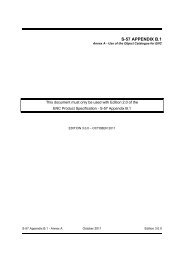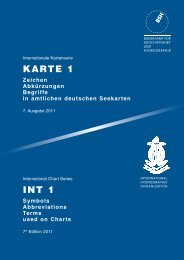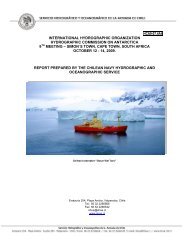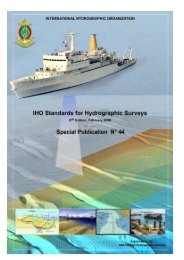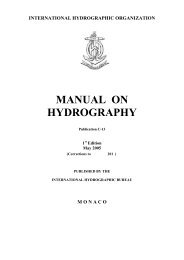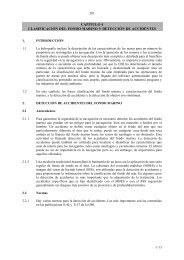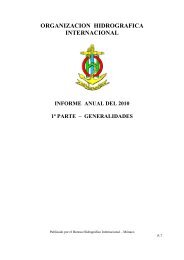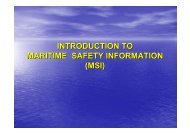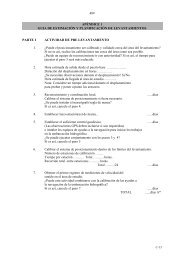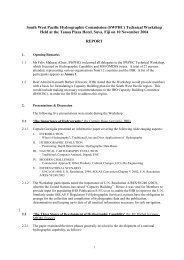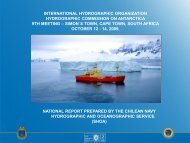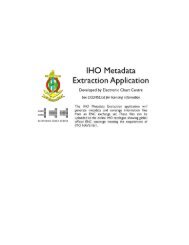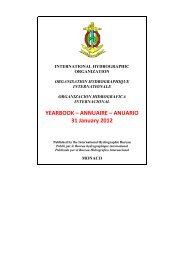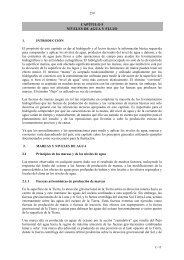CHAIRMAN'S OPENING WORDS Ladies and Gentlemen, dear ... - IHO
CHAIRMAN'S OPENING WORDS Ladies and Gentlemen, dear ... - IHO
CHAIRMAN'S OPENING WORDS Ladies and Gentlemen, dear ... - IHO
- No tags were found...
Create successful ePaper yourself
Turn your PDF publications into a flip-book with our unique Google optimized e-Paper software.
EAtHC10-01C10 th EAtHC-CHAtO MEETINGLOMÉ, TOGO 3, 4 & 5 December 2008CHAIRMAN’S <strong>OPENING</strong> <strong>WORDS</strong><strong>Ladies</strong> <strong>and</strong> <strong>Gentlemen</strong>, <strong>dear</strong> colleagues,It is a great honour for me, as Director of the Spanish Hydrographic Office, tohave the opportunity to chair this Tenth Meeting of the Eastern Atlantic HydrographicCommission.Personally, it is a great pleasure for me <strong>and</strong> I think that for all of us attendingthis meeting to have the opportunity to visit again the country of an Associate memberof our Regional Commission. Two years ago, for the first time <strong>and</strong> after amending ourStatutes, our Ninth meeting was held in Dakar, Senegal. Now, going ahead with theagreed purpose of holding our meetings in those countries that can take advantage ofthis events in order to support the development of their national hydrographic services,we are meeting in Lomé the capital city of a country, Togo, which is deeply involved inthis process of consolidating its hydrographic infrastructure.A clear sign of this process was the signature of the Statutes of this RegionalCommission, ceremony that took place the 9 th of November 2007, during the technicalvisit accomplished by SHOM Staff to Togo <strong>and</strong> Benin. In this way, Togo became anAssociate member of the Eastern Atlantic Hydrographic Commission <strong>and</strong> able to hostthis plenary session.Let me therefore <strong>and</strong> first of all to thank the Government of Togo, representedhere today by His Excellency the Prime Minister (the delegate of the Minister ofTransportation), for accepting the invitation to host this meeting <strong>and</strong> of course I wouldlike also to thank the Director General of the Port of Lomé <strong>and</strong> all his staff, focal pointof the organization process. I know that you all have done an excellent work in thepreparation of these sessions <strong>and</strong> on behalf of all the distinguished delegations who areattending this meeting, receive my congratulations <strong>and</strong> my appreciation for your effort.The Togolese Republic, moving forward in its desire of improving theirhydrographic services is going to sign during this Opening Ceremony a bilateralarrangement with France that has been prepared during this last year. Let me welcomethe Ambassador of France to Togo who will sign this arrangement on behalf of theFrench Government. We really appreciate the big effort that France is doing subscribingthis arrangements, such as the last one just signed between France <strong>and</strong> Morocco the 21 stof January of this year, <strong>and</strong> a third one with Cameroon which is currently in its final1
phase of negotiation. All these bilateral agreements are a clear sign of the firmdetermination of France to collaborate with the development of hydrographic services inthis region.I would also like to welcome all the delegations who are here today; Members,Associate Members, Observers <strong>and</strong> International Organizations <strong>and</strong> very specially letme welcome Captain Hugo Gorziglia, Director of the International HydrographicOrganization, whose advice <strong>and</strong> expertise will help us very much during thedevelopment of this meeting. I would like to inform you that I have received theapologies of Morocco <strong>and</strong> DOALOS who will not be able to attend this meeting butwho had the courtesy of letting me know in advance.During these three days we will review all the events that took place during thelast two years affecting our Regional Commission <strong>and</strong> we will try to establish thoseobjectives that will help us with the improvement of the nautical cartography <strong>and</strong> thepromulgation of maritime safety information within this region for the next two years.I am conscious that not too much progress has been achieved during this periodof time. The lack of enough funding <strong>and</strong> hydrographic infrastructure in this area makesit difficult to achieve some of our goals. Actions specified in bilateral agreements <strong>and</strong>activities funded by the Capacity Building Committee of the <strong>IHO</strong> are important ways tomake progress in our activities. Those countries with cartographic responsibility in theregion are doing big efforts to update the hydrographic surveys <strong>and</strong> afterwardsproducing the corresponding nautical charts. And the CBC is also trying to collaborateby funding several regional projects.Three different projects are on their way right now in our Commission <strong>and</strong> wewill discuss about them during this meeting. Let me mention now the “Basic PracticalHydrographic Survey Course”. In this one we hope to collaborate with the MaritimeAcademy of Accra that will probably host this course. Let me welcome thedistinguished delegation from Accra Maritime Academy who is attending this meeting.Please, be welcome to our Commission.We will have the opportunity during these days to prepare a list with theproposals of new projects to be discussed during the next CBC meeting. We will try toinclude in that list those projects that, from a realistic point of view will, most probablyhave the chance to receive funding <strong>and</strong> be finally accomplished during the next months.But these are not the only ways of receiving funds. There is a third way that canbe accomplished by the developing nations in the region applying through theirrespective Governments for assistance which is available from relevant internationalorganizations (for example European Union, United Nations Development programme<strong>and</strong> World Bank), according to <strong>IHO</strong> Circular Letter 17, 2008.2
We all know that we are dealing with a difficult task. All the countries in theregion know how important maritime transportation is for the developing of nationaleconomies. And they also know which is the way to go in order to make it efficient <strong>and</strong>effective. As it was agreed <strong>and</strong> expressed last year in the Declaration of Abuja, we neednow to continue making national authorities in the region know that they must considerpaying special attention to maritime safety <strong>and</strong> at the same time bringing forwardprojects for external funding.A good way of paying attention to maritime safety is to create national offices incharge of hydrographic <strong>and</strong> maritime safety information issues. These offices should bethe point of contact between national governments <strong>and</strong> international organizations suchas <strong>IHO</strong> <strong>and</strong> IMO. Once that kind of national Hydrographic Committee exists, it is easierfor that country to organize the future development of a national hydrographic officeable to produce its own cartography. That Committee must be the focal point thatconcentrates the efforts made by a specific country in order to get funds, technicaladvice <strong>and</strong> personnel training.Also they must not forget, according to <strong>IHO</strong> Circular Letter 72 2008, that the<strong>IHO</strong> Directing Committee is always available to approach relevant authorities, whereindividual national Hydrographers consider that this will help them raising the levels ofawareness <strong>and</strong> commitment to provide appropriate hydrographic services in theircountries.Therefore, countries in the region should also commit themselves in the creationof these Hydrographic Committees that must be the first step in the development of anational self-dependant hydrographic authority.Togo is a clear example of this commitment. Following the directions given bythe <strong>IHO</strong>, they announced one year ago the creation of their Working Committee onHydrography, Oceanography <strong>and</strong> Maritime Navigation Safety <strong>and</strong> this year they haveestablished the organization <strong>and</strong> the working rules for this Committee. This is a goodway to go.I have already mentioned the bilateral agreements that will be signed this year<strong>and</strong> the other one that will be signed soon. The Capacity Building Committee, as it hasalready been said before, is developing also a very important task in these last years <strong>and</strong>will continue in this way in the future. Specific amounts of money for specific projectsfocused in hydrographic capability assessment, technical advice <strong>and</strong> professionaltraining. This is considered to be the best way of investing the limited available funds.Working all together is the only way in which we will be able to find a finalsolution to problems related to maritime safety. It is not just having nautical charts beenproduced by foreign countries. Our final goal must be to have countries in the regionproducing their own reliable charts.3
And the only way to do this is using all the available means: nationalcommitment, bilateral arrangements <strong>and</strong> CBC projects can be three good columns tost<strong>and</strong> on. Let’s take good advantage of these three days in order to programmeaccordingly our future actions.I wish all of us a successful meeting.I would like to thank again the Togolese Authorities for their hospitality.And to all of you thank you very much for your attention. And now, let me leave thefloor to Captain Hugo Gorziglia, Director of the International Hydrographic Bureau.4



